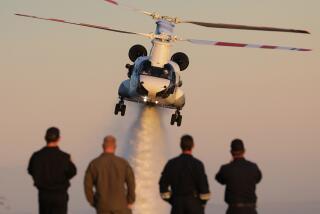FAA and Aspen in Dogfight Over Airport Curfew : The county cites safety for banning private planes after sunset. Residents want quiet evenings. But the government wants equal access.
- Share via
ASPEN, Colo. — The roar of jet engines plowing through a snowstorm near the 12,000-foot granite peaks surrounding this ski resort’s busy airport gives Pitkin County Sheriff Bob Braudis the willies.
“I’m in charge of mass casualty response,” Braudis said, “and there’s no doubt that a big jet calling a distress signal late at night in a driving snowstorm would eclipse our ability to respond.”
But that is not the only reason Braudis says he will fight to keep a controversial sunset curfew at Aspen Airport, the only airport in the nation with a two-tiered curfew that bars charter and private aircraft after dark.
For four years, the Federal Aviation Administration has tried to halt the curfew, contending that private pilots should be allowed to fly in and out until 11 p.m., just like commercial planes.
“The safety issue is partially a straw dog,” Braudis said. “The real issue is environmental--the easier it is to get in here, the more people will come.”
In what locals see as a showdown over Aspen’s ability to control its environment--in the air and on the ground--the Pitkin County Board of Commissioners this month made a final offer to resolve the bitter dispute.
Under the county’s compromise, private pilots would be allowed airport access until 11 p.m. if they have the same training, safety equipment and power capabilities required of commercial aircraft.
After repeated warnings to end the curfew, the FAA last year halted Aspen’s $1 million in annual federal funds for improvements at the airport--the third busiest in the state.
Whether the FAA will go along with barring lesser equipped private pilots--which could set a precedent for airports elsewhere--is another matter.
And in a community known as a getaway for the rich and famous, they’d just as soon foot the bill to keep extra air traffic out. Warned Pitkin County Commission Chairman Bill Tuite: “If our compromise is not accepted by the FAA, we’ll move to take the airport private and pay for improvements and maintenance ourselves.”
Aspen enacted its two-tiered curfew in 1978 after a series of plane crashes and numerous injuries and deaths--most of them attributed to pilot error.
The FAA tacitly allowed the system to exist for more than a decade but changed its tune after private and business aircraft owners’ groups started lobbying heavily in 1989. Their argument: The earlier curfew denied equal access to private and charter planes. The FAA agreed, contending that airports receiving federal dollars could not discriminate between commercial and private carriers.
Pitkin County’s proposed compromise is similar to one recommended this week by the General Accounting Office after a lengthy study of safety at high-altitude airports. While noting that the FAA has the authority to spike the sunset curfew, the GAO study advised the county that if private planes meet the same rigorous requirements for instrument flight as commercial airlines, then they should be permitted access until 11 p.m.
Nonetheless, the GAO concluded that significant safety issues are associated with the airport. Fourteen general aviation accidents occurred between October, 1982, and September, 1992, within 15 miles of Aspen Airport, the study found. That rate of 4.1 accidents per 100,000 operations at Aspen Airport was 78% higher than at four similar mountain airports.
Beyond safety issues, county officials admit that their well-to-do residents don’t want more noisy aircraft interfering with dinner chats in multimillion-dollar chalets.
Among longtime residents who cherish the peace and quiet is environmentalist and rock star Don Henley, who owns a farmhouse near the flight path. So far, he has spent more than $250,000 to bankroll the county’s legal war with the FAA, county officials said.
“Henley is a man who lives by his lyrics. Remember the line in his song, ‘Call someplace paradise, kiss it goodby’?” said Pitkin County Commissioner Wayne Ethridge. “He just wants to preserve the community he loves.”
But many business owners object to the county’s stand, saying their livelihoods depend on the planeloads of skiers who fuel the resort’s financial furnace.
“The county is hurting itself by encouraging people to go to other airports (and ski resorts) in the region who want the business,” said Dan McCarty, a pilot of 23 years and spokesman for Tailwinds Aviation in Aspen.
Aspen Chamber of Commerce President Tom Hines agrees.
But Pitkin County Commissioner Mick Ireland figures the residents of a resort town where home values average $1.2 million can easily absorb a property tax to raise the $1 million a year it would cost to operate the airport.
FAA officials contend there is room for compromise but declined to comment on the county proposal pending a detailed study.
More to Read
Sign up for Essential California
The most important California stories and recommendations in your inbox every morning.
You may occasionally receive promotional content from the Los Angeles Times.














